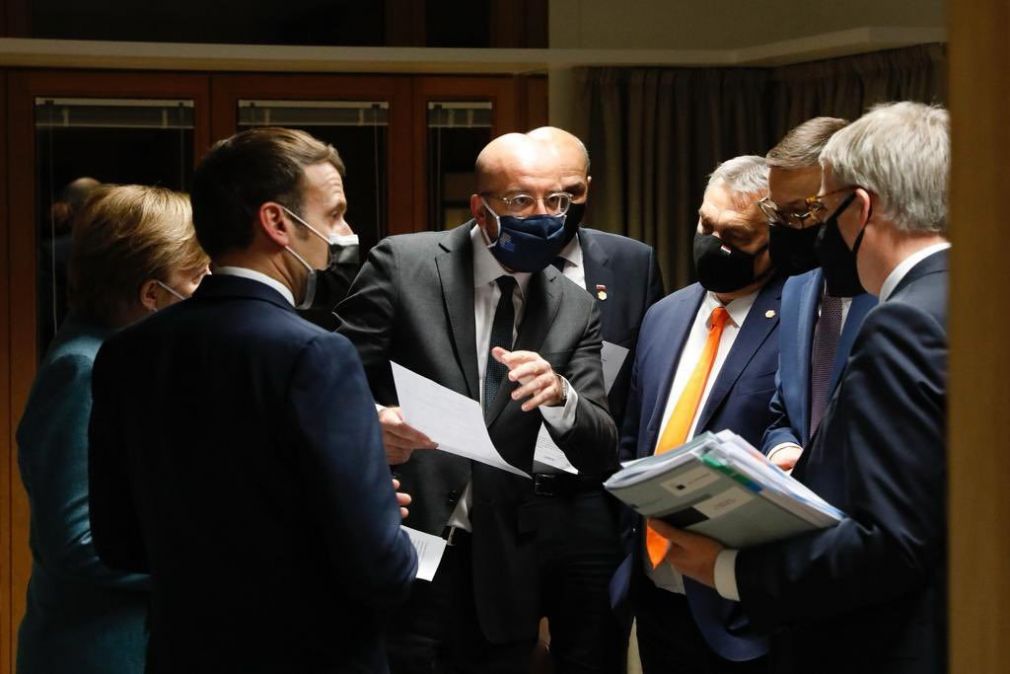by P.T.
After a very brief discussion today in Brussels, leaders of EU members confirmed a compromise lifting the Hungarian and Polish blockades on the 1,824 billion euros worth of recovery package. The essence of the compromise is to delay the usage of the conditionality of European funds with the rule of law until the decision of the EU Court of Justice on the legality of this measure.
The reason for the blockade was Hungarian and Polish opposition to the conditionality regulation to protect the budget. This identifies breaches of the rule of law, that can be punished by freezing European funds, and the procedure for taking action against violators.
While the range was initially limited to financial management, it was extended in negotiations between the German Presidency and the European Parliament to jeopardising the independence of the judiciary, inaction in the event of unlawful decisions by public authorities, and restrictions on access to justice means.
Hungary and Poland were not prepared to support this, but as the regulation is adopted by a qualified majority, they cannot prevent the adoption. Therefore, they have delayed the adoption of two other essential parts of the package – the multiannual budget legislation and the agreement on own resources, which are adopted by consensus.
Germany, which holds the Presidency of the Council of the EU, played a key role in finding a compromise. The blockade was resolved with additional explanations in the form of the summit decisions, which they adopted. The point is that the possibility of punishments by freezing funds for violating the rule of law has been postponed until the court’s decision.
The agreement on the package was announced on Twitter by the President of the European Council, Charles Michel. “We can now start implementing and rebuilding our economies,” he pointed out.
An appropriate legal basis for the enforcement of packages is provided
According to the agreement, Slovenian Prime Minister Janez Janša tweeted that after a successful first half at the July EU summit, “prior intensive preparations and today’s ‘dynamic’ coordination they provided an appropriate legal basis for the implementation of packages with a good compromise”.
The leaders wrote in their conclusions that the usage of the conditionality mechanism, anticipated by the disputed regulation for protection of the Union’s budget, would be objective, fair, and impartial as well as based on facts, ensure equal treatment of all members and respect national identities of members.
The European Commission will not propose measures in accordance with the regulation until it has developed guidelines, accounting aforementioned principles, for the usage of the conditionality mechanism. The guidelines will be determined by the decision of the EU Court of Justice. Thus, there will be no sanctions until the court’s decision is known.
The rule of law will be judged by the court
The measures will have to be proportionate to the effects of breaches of the rule of law on the financial management and interests of the Union, and the causal link between the breaches and the negative consequences will have to be sufficiently direct and properly established. It will not be enough to just find out that a violation has happened.
Decisions also include an emergency break – in the event of a proposal for a freeze or non-payment of funds due to non-compliance with the rule of law, a member may submit the matter for discussion to the European Council, which will seek for a best common position on the matter.
In addition, the conditionality of European funds with the rule of law will only apply to the 1,824 billion euros package, which includes the future seven-year budget of the Union and the recovery fund, but not the payments from the previous budget period.
The procedures for approval of the legislative framework for the package can now be continued. A political agreement on the package was reached by the leaders of member countries in July, however, the legislative framework for this complex package still needs to be finalised, namely together with the European Parliament.
The summit continues. The question of strengthening the target for reducing emissions by 2030 from the current 40 to at least 55 percent is still open. The agreement on the package was otherwise considered under a condition for agreeing on a climate goal.
Leaders are now discussing about Turkey. They have also already adopted coordination decisions on covid-19, relations with the United States and the extension of economic sanctions against Russia over Ukraine. They are also expected to take note of the situation in the negotiations on relations with the United Kingdom after Brexit.

